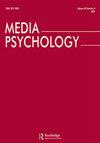你所期望的(不是)你所得到的:信息特征的初始和事后判断对政治信息回忆的影响
IF 2.6
2区 心理学
Q1 COMMUNICATION
引用次数: 0
摘要
摘要政治文本的复杂性——作为文本的一个重要特征——如何独特地影响读者的政治信息处理?基于元认知反应框架和基于启发式系统模型与精化可能性模型的现有讨论,我们测试了读者对信息特征的初始期望和稳定的个体差异是否与元认知处理流利度体验交叉。当人们看到比他们预期的更复杂或更不复杂的文章时,他们是否会从新闻中回忆起更多的信息,或者当文章复杂性的预期得到满足时,他们会回忆起更多信息?对谁来说,这种情况更有可能发生?我们的研究结果有力地支持了这样一种观点,即客观复杂性确实是元认知感知处理流畅性和信息回忆的主要驱动因素,同时也部分支持了一致性在这一过程中的作用。研究结果还表明,处理能力的个体差异对信息回忆的形成起着重要作用。最后,我们讨论了其理论和实践意义。本文章由计算机程序翻译,如有差异,请以英文原文为准。
What you expect is (not) what you get: the impact of initial and post-hoc judgments of message characteristics on political information recall
ABSTRACT How does a political text’s complexity – as a crucial characteristic of a text – uniquely affect readers’ political information processing? Based on a metacognitive response framework and extant discussions based on the Heuristic-Systematic Model vs. the Elaboration Likelihood Model, we tested whether a reader’s initial expectation of a message characteristic and stable individual differences intersect with the metacognitive processing fluency experience. Do people recall more information from the news when presented with articles that are more – or less – complex than they expected, or do they recall more information when expectations of article complexity are met? And for whom is this more likely to occur? Our results provide strong support for the notion that objective complexity is indeed the main driver of metacognitive perceptual processing fluency and information recall, while also rending partial support for the role of (in)congruency in this process. The results also showed that individual differences in processing capabilities play a significant role in shaping information recall. We conclude by discussing the theoretical and practical implications.
求助全文
通过发布文献求助,成功后即可免费获取论文全文。
去求助
来源期刊

Media Psychology
Multiple-
CiteScore
8.60
自引率
7.10%
发文量
30
期刊介绍:
Media Psychology is an interdisciplinary journal devoted to publishing theoretically-oriented empirical research that is at the intersection of psychology and media communication. These topics include media uses, processes, and effects. Such research is already well represented in mainstream journals in psychology and communication, but its publication is dispersed across many sources. Therefore, scholars working on common issues and problems in various disciplines often cannot fully utilize the contributions of kindred spirits in cognate disciplines.
 求助内容:
求助内容: 应助结果提醒方式:
应助结果提醒方式:


